Open State, Global Assembly, and Alliances - Open Gov #03
Current news on open government, open state and civic participation activities. August 2021.
Available in:
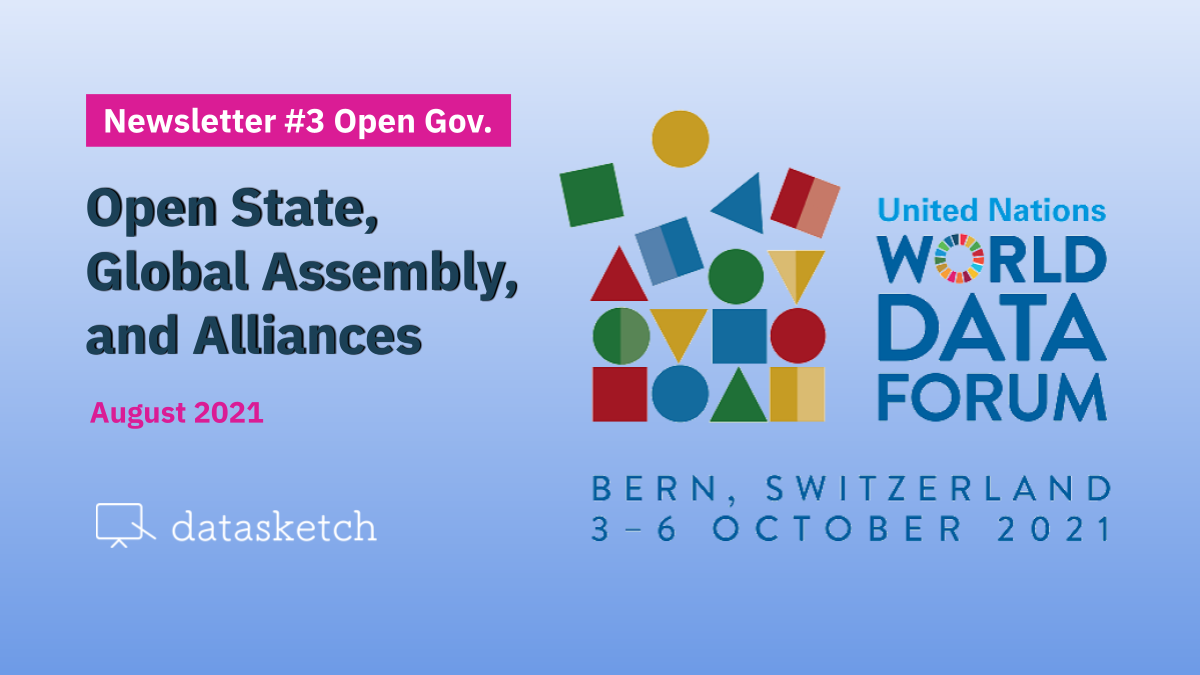
Have you reached us through social networks, or have you been forwarded this newsletter and want to receive it in your email twice a month? Subscribe!
You can read the Spanish version here.
In this newsletter, compiled and edited by the Datasketch Open Government team (Laura Tamia Ortiz, Gabriel Jiménez, María Juliana Rodríguez, Juliana Galvis, and Juan Pablo Marín Díaz), you will find relevant and updated information related to Open Government around the world. You can unsubscribe or update your preferences, but first, check the contents we have for you. If you want to read the previous newsletters, you can do so at Datasketch: Open Government Newsletter.
#DATASKETCH
Datasketch continues in the Colombian Open Government Committee!
The Open Government Committee of Colombia is the multi-stakeholder forum in charge of designing and implementing the National Open Government Plans (NAP). It is responsible for the methodology design for the co-creation of the NAPs and monitoring, evaluation, and measurement of their implementation. In addition, it ensures compliance with the principles set out by the Open Government Partnership (OGP) and citizen participation throughout the process.
The Committee is renewed every two years. This week, the Transparency Secretariat of Colombia revealed those selected for the 2021 - 2023 term: Datasketch has been re-elected! We celebrate our participation in the committee, having passed the evaluation by experts and continuing working from this stay in our goal of democratizing access to information and strengthening public management. You can read more in Datasketch Continues on the Open Government Partnership Committee.
Open government for dummies: Open state, open justice, and open parliament.
A few months ago, we started writing a series of blog posts called “Open Government for Dummies.” In it, we review the concepts and currents of Open Government and show examples of implementation worldwide. We believe that Open Government policies should not be limited to the executive. Therefore, this newsletter will focus on a current governance model that includes all state actors: the Open State.
The Open State emerges as an evolution of Open Government that seeks its integral incorporation in all public administration bodies. The OECD describes it as the sum of open government, open justice, and open parliament. It is a transparent, multidirectional, collaborative governance model oriented to citizen participation in monitoring and public decision-making. First, we invite you to read our posts. Then, you can go deeper into the subject, find conceptual references, and learn how the judiciary and legislature are implementing open actions inside and outside OGP.
- Open Government for Dummies: Open State
- Open Government for Dummies: Open Justice
- Open Government for Dummies: Open Parliament
- Interview with Germán Bula
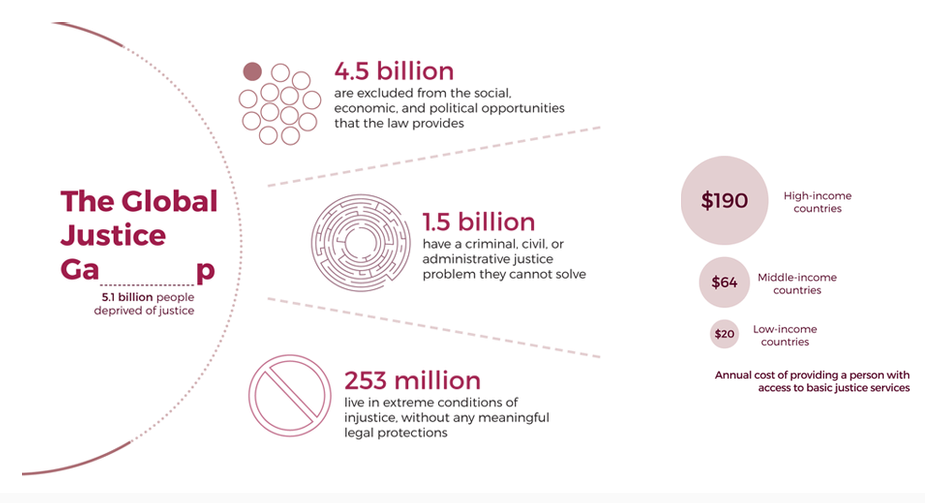
#PARTICIPATION
Global Assembly COP26 Glasgow 2021
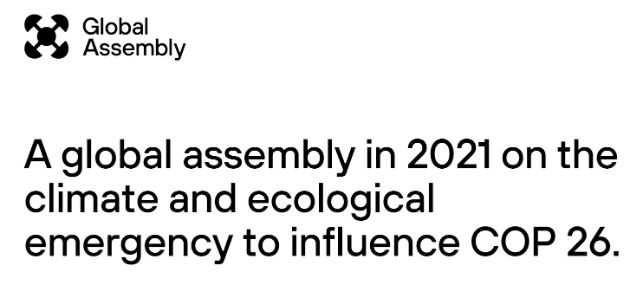
Global Assembly is organizing an international ecological and climate emergency assembly to influence COP26 (03/10/21 - 12/11/21). It will be a global citizens' assembly to accelerate action to address the climate and ecological emergency and influence COP26 in whatever way citizens see fit. It has two objectives: to generate political mandates for change from citizen advocacy and to recognize the role of individuals, organizations, and institutions in addressing global challenges.
The Assembly will involve a core group of 100 people selected by sortition - disaggregated by gender, race, age, economic status- to have a representative sample of the actual diversities of the world’s population and distributed groups, led by anyone anywhere - communities, schools, organizations - that seek to generate a global conversation to explore the scale of the climate emergency and how to respond effectively. The Assembly is under construction,, and they are looking for volunteers, hosts, artists, among other roles. You can find more information and get involved at https://globalassembly.org/get-involved.
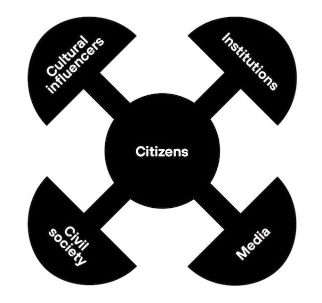
Source: https://globalassembly.org/
Data for a Decade of Action on the Sustainable Development Goals. Berne Pact.
The High-Level Group on Partnership, Coordination and Statistical Capacity Building for the 2030 Agenda for Sustainable Development (HLG-PCCB) has drafted the Berne Data Compact for a Decade of Action on the Sustainable Development Goals to be launched at the United Nations World Data Forum 2021 on October 6, 2021, in Berne, Switzerland. As a final step, an open consultation has been launched to obtain input from stakeholders and Forum participants before its adoption.
The document makes a general call to action to develop data use capabilities, build partnerships, produce data to leave no one behind, ensure that data is presented in a timely, open, and unbiased manner, and build trust. The consultation seeks feedback for improvement through 5 critical questions on the state of coordination in the data ecosystem, support for multi-stakeholder data partnerships, priority areas for modernization and further strengthening of data dissemination, information on key activities that will contribute to the commitments outlined in the document, and comments.
If you would like to participate in the consultation, you can do so until September 13. https://unstats.un.org/sdgs/hlg/Open-consultation-on-the-Bern-Data-Compact/
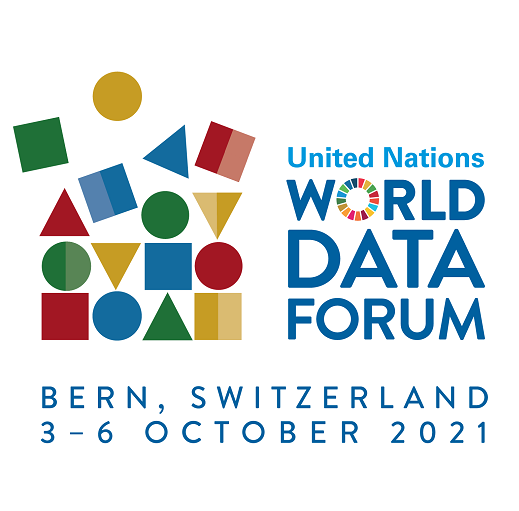
#Open-Gov-Experiences
Follow-up of the IV Open Government Plan in Spain
The Open Government Forum of Spain (es) has published its monitoring dashboard of the IV Action Plan on the Transparency portal of the State Public Administration. The implementation status of the initiatives is updated with the information shared in the meetings of its working groups. The last update was made on June 15 and corresponded to the initiatives discussed during the Open Government Communication and Collaboration Working Group meeting. You can identify the execution percentage of the initiatives included in the plan and access a summary of the execution status.
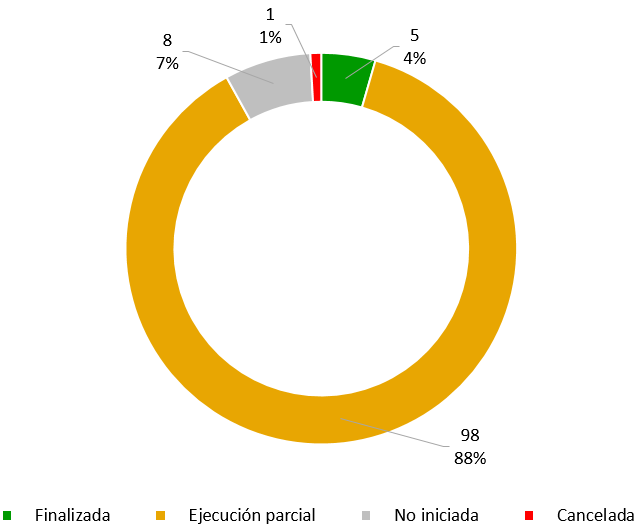
Source: Transparency portal of the State Public Administration.
One of the commitments included in the action plan is “Commitment 2. Plan for the improvement and reinforcement of transparency,” which consists of the initiative “Good practices in the commercial registry: improvement in the access to data collected in the commercial registry” and, in turn, two activities, “Transposition of the directive: Public information and request for mandatory reports” and “Transposition of the directive: subsequent procedures.” The first shows partial progress. The second has not started. Concerning this commitment, @JaimeObregon, programmer and computer activist known for promoting transparency in public sector procurement, has created a campaign in networks for the data of the Commercial Registry in Spain to be published openly, structured and accessible. Urging the Spanish Government to follow the example of the UK’s Companies House, which makes the annual accounts of British companies available for free download in both complete and simplified form.

UK Companies House: everything open and free vs. Commercial Registry in Spain: Oh, that would be too expensive. Source: https://twitter.com/JaimeObregon
Guatemala's Fifth Open Government Plan
The government of Guatemala is preparing its fifth open government action plan, which will be developed between 2021 and 2023. It has as transversal axis transparency in Public Management and the State budget, acquiring commitments focused on accountability regarding the execution of public resources and promoting governance. Since October 20, 2020, a dialogue has been woven between the government and various civil society organizations (CSOs) to create the fifth action plan of the Open Government of Guatemala, which will be presented next October.
The organizations involved are involved in monitoring the execution of the government’s public budget and the quality of spending. In addition to the 12 CSOs participating in the plan design process, there are 37 public institutions. The topics related to the plan’s commitments are the modernization of public management, digital government, education, food health, environment, climate change, disaster risk management, poverty reduction and migration, social inclusion, and others. You can read the full story at Preparan quinto plan de Gobierno Abierto – Noticias Última Hora de Guatemala (es)
If you want to participate in the construction of the Plan or learn more about the proposals, please visit Gobierno Abierto Guatemala – Transparencia, Rendición de Cuentas y Participación Ciudadana (es)
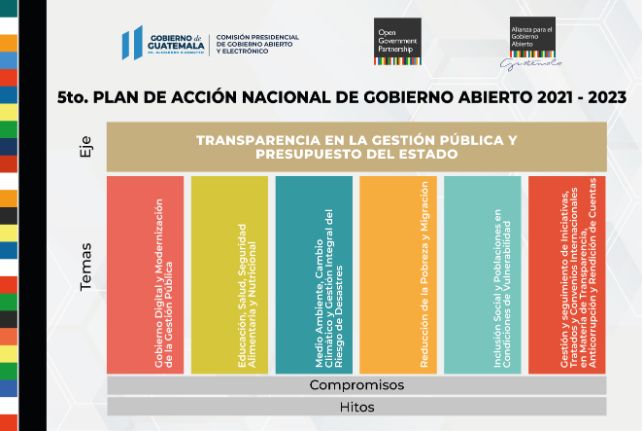
Formulation of municipal open state initiatives within the framework of the 2030 Agenda - Chile
On Friday, August 6, the workshop “Formulation of municipal Open State initiatives within the framework of the 2030 Agenda” (es) was held to strengthen governmental capacities, especially local ones, to implement actions based on the principles of an Open State. This workshop was conducted by the Latin American and Caribbean Institute for Economic and Social Planning (ILPES) of the United Nations Economic Commission for Latin America and the Caribbean (ECLAC), together with Fundación Tribu, the Chilean Association of Municipalities; with the sponsorship of the Open Government Alliance (AGA).
The ILPES official and the executive secretary of the Chilean Association of Municipalities emphasized the need to incorporate the axes of the Open State in the 2030 Agenda, especially those related to territorial development processes and the importance of municipalities’ promoters of citizen participation. Similarly, the Deputy Director of the Open Government Rural Alliance highlighted the number of local governments that have joined the Alliance, which is vital in applying the principles promoted by AGA.

Source: http://www.chileagenda2030.gob.cl/ods/img/logo.png
Institutional Index for Municipal Open Government
The Chilean Institute of Municipal Studies of the Autonomous University of Chile has published the third version of the Institutional Index for Municipal Open Government - IIGAM. It is a measurement carried out during 2020, which seeks to observe the progress and challenges of implementing formal mechanisms of transparency, access to information, integrity, and citizen participation at the municipal level in Chile. It identifies significant progress in formal compliance with legislation but a large gap in public innovation at the local level. Institutional Index for Municipal Open Government: IIGAM Chile 2020
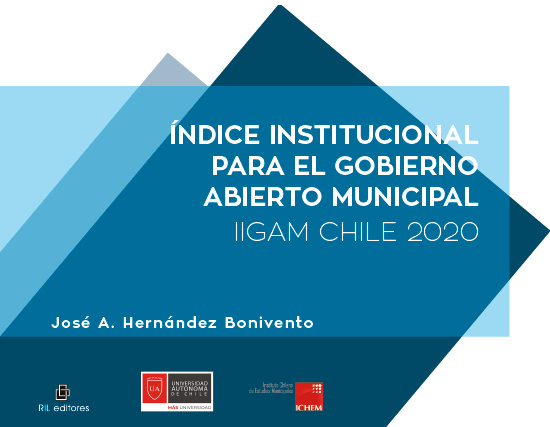
Source: https://ediciones.uautonoma.cl/index.php/UA/catalog/book/105
#STATEMENT
Indefinite presidential reelection is contrary to the American Convention on Human Rights.
On August 13, the Inter-American Court of Human Rights published the Advisory Opinion issued on June 7 in response to Colombia’s consultation on indefinite presidential reelection within the Inter-American Human Rights System. The Colombian State consulted the Court on whether the prohibition of this figure was contrary to the American Convention on Human Rights, considering that it may result in a restriction of the rights of the ruler seeking reelection and those of his voters. Thus, for the Court, indefinite presidential reelection contradicts the principles of representative democracy and its obligations under the Convention and the American Declaration of the Rights and Duties of Man.
The Court affirmed that indefinite presidential reelection is not an autonomous human right because it is not recognized in the Convention or the Declaration nor recognized in international human rights law or other international treaties. Finally, the Court noted that the prohibition of this figure might be compatible with the Convention, provided that it is so provided by law. The Court considers that this prohibition seeks to protect and guarantee representative democracy, as it helps to balance the concentration of power that a president has in a presidential system. Therefore, this is the most appropriate measure to avoid affecting democratic principles and prevent opposition political parties and movements from being weakened by not reaching power in a fair and accessible manner.
On the Court’s official website, you can read the complete press release.
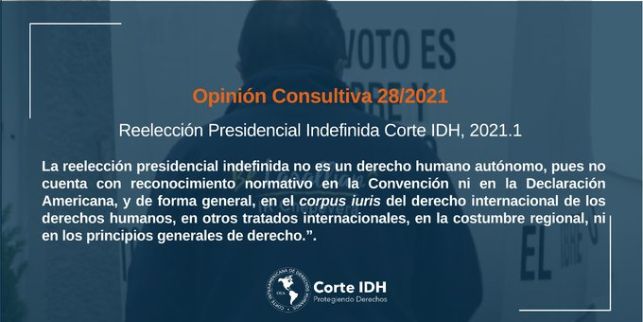
Source: https://twitter.com/CorteIDH
#CORPORATE_ENGAGEMENT
Schneider Electric helps strengthen companies' transparency on their environmental, social, and governance criteria.
Energy solutions and digital automation company Schneider Electric announced the launch of an environmental, social, and governance (ESG) criteria compliance communication tool that will help other companies consolidate their credibility and leadership when meeting these standards. According to the article, “Schneider Electric is committed to ESG transparency for companies” (es), the tool is designed to provide comprehensive solutions to companies' needs through transparent communication about their progress in sustainability, climate action, and renewable energy. To this end, Schneider Electric will provide advisory services in communication and marketing.
The launch of this tool follows a study conducted by the company and the GreenBiz media group, which found that, although companies are taking practical actions to achieve sustainability, these efforts are not adequately communicated. At the institutional level, governments are also paying attention to this issue. For example, in March of this year, the U.S. Securities and Exchange Commission announced the creation of a task force to monitor compliance with ESG criteria and to find cases of “greenwashing,” i.e., presenting products as environmentally friendly when, in fact, they are not.
If you want to know more about this topic, you can consult the Schneider Electric website for the energy and sustainability consulting services it offers.
#EVENTS
Datathon to prevent the third wave Peru
This Datathon will take place virtually between August 20 and 21. It seeks to bring together civil society, academia, the public and private sectors, and citizens through collaborative work to propose preventive solutions to the current challenges faced by the State in the face of a possible third wave of COVID-19, based on open data in two areas: the vaccination process and the new normal. It also aims to strengthen the National Data Governance Strategy to support decision-making and improve public services through the evolution of the publication, use, and consumption of open data. If you are interested, you can still register at https://www.gob.pe/dataton2021.
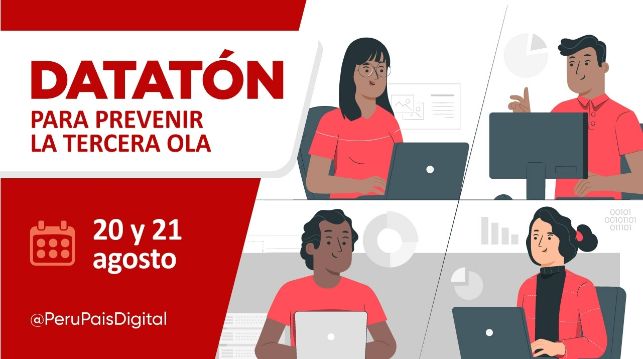
Source: https://www.gob.pe/dataton2021
Open Farming Hackdays
Between September 3 and 4 in the Swedish municipality of Gränichen, the second edition of the Open Farming Hackdays event will be aimed at the agricultural business sector to support the ecological intensification of agriculture through creative ideas and prototypes based on Open Farming Data. The objective is to create data-driven applications and tools that will enable producers to farm more efficiently and sustainably, seek technological solutions to rising production costs, improve cost awareness, promote the ethical use of social media marketing and use blockchain technology.
This initiative comes in a context where demand for product quality, resource use, and environmental protection has increased while product prices are falling. New pests and diseases are constantly appearing in Switzerland, requiring plant protection products and thus leading to high costs. In addition, climate change requires a rethinking of land management. Learn more about this project at Opendata.ch » Open Farming Hackdays | 3. – 4. September 2021
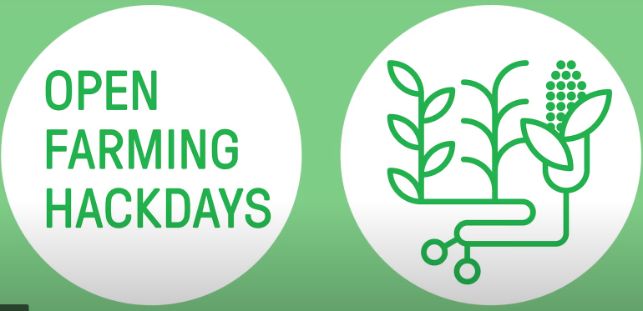
Source: https://opendata.ch/projects/open-farming-hackdays-2021
GIGAPP VIRTUAL WEEK
GIGAPP, a Research Group on Government, Administration, and Public Policy, will organize a virtual meeting of research, training, and Ibero-American debate from September 28th to October 1st. It will be four days in which government, administration, and public policies will be discussed from different angles. Experiences in transparency, innovation and social participation policies, evaluation of public policies, use of digital tools in public institutions, and inclusive policies, both in terms of gender and care and dependency, will be discussed. If you want to know the full schedule and access the links to the event, visit: https://sites.google.com/view/semanavirtualgigapp/inicio (es/pt)
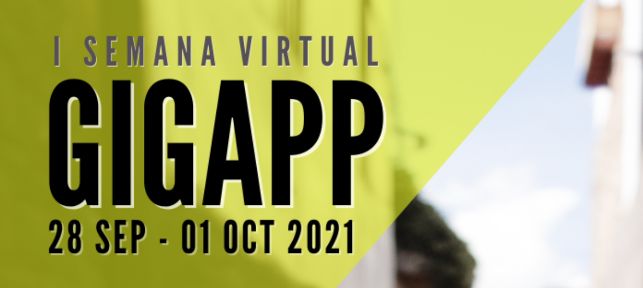
Source: https://sites.google.com/view/semanavirtualgigapp/inicio
#ARTICLES
Creating public-private data partnerships to improve official statistics.
Official statistics are a compass for policymakers because of their quality, impartiality, and transparency. In the current post-pandemic context, they become more necessary than ever. The wealth of data produced by society can help statisticians working in public institutions improve the relevance, timeliness, and depth of their output. The article “Principled data access: building public-private data partnerships for better official statistics” argues that public-private collaboration is necessary to exploit the potential of data of public interest, which in many cases belong to private parties. It proposes principles to enable partnerships between stakeholders from different sectors.
The principles presented are compatible with various legal frameworks. They aim to establish trust between data collectors, stakeholders, and statistical authorities while ensuring the technical utility of the data and the sustainability of partnerships between stakeholders over time. However, they are divided by the audience they affect: general, official statistical agencies, and data collectors in the private sector. They range from partnerships with clear objectives and time limits, establishing overall responsibility and accountability for the process and results, and promoting the international comparability of technical methods and systems.
Community justice: Putting people first
The degree to which the participation of communities in judicial processes has become important has cemented models of community justice. These community justice models have become alternatives for addressing justice reform, as evidenced by alternative systems rooted in traditions or support in community paralegals.
In 2019, the OGP Justice Coalition was formed through OGP to create and implement justice commitments in action plans. Some of the lessons learned through dialogues and experiences with communities include the preference for solving problems through community justice over the formal justice system; the advantage of community justice models in alleviating pressure on the traditional justice system; and finally, the OGP co-creation process represents the enabling framework for designing a community justice mechanism that addresses the problems of the population..,
https://www.opengovpartnership.org/stories/community-justice-putting-people-first/
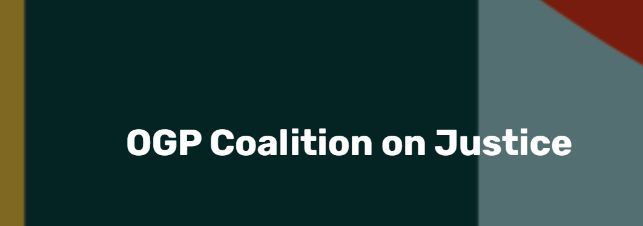
Source: https://www.opengovpartnership.org/ogp-coalition-on-justice/
Comparing Sources of Mobility for Modelling the Epidemic Spread of Zika Virus in Colombia
Comparative data on human mobility helps prevent and prepare for significant events, such as epidemics, but these data are difficult to access. In these cases, cell phone metadata becomes a great source of information on the transit of people, although if not used responsibly, they carry risks that infringe on people’s privacy.
In this research (en), call records in contexts of human mobility were taken to predict the spread of the Zika virus (ZIKV) between 2015 and 2016 in Colombia, taking other traditional data sources as a reference. It was found that the proximity of cell phone data captured a better picture than human mobility patterns. Read the complete study at Comparing Sources of Mobility for Modelling the Epidemic Spread of Zika Virus in Colombia - UN Global Pulse.
That's all for now!
If you liked the content of this Newsletter, we invite you to share it with your friends and acquaintances. Furthermore, if you have reached us through social networks or have been forwarded this newsletter and want to receive it in your email twice a month, subscribe!
We have other newsletters that may be of your interest.




